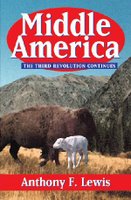Since I so thoroughly enjoyed Anthony F. Lewis’ first novel,
The Third Revolution, I’m sad to report that its just-published sequel,
Middle America, is a disappointment.
The Third Revolution was a political nail-biter. A real corker about a constitutional battle that erupts in 2013 when the state of Montana resists an overreaching One Nation Act that federalizes literally everything. Montana is threatened with martial law and even military action, but by book’s end, it successfully secedes from the Union. Of course, there are murky waters ahead for a new, independent state, and I anticipated a blockbuster sequel.

The cover of Middle America promises that “the Third Revolution continues.” And when the book picks up the story five years after Third Revolution, Idaho, North and South Dakota, and Wyoming have already joined Montana to form the Confederation of Middle American States. Here, free markets rule. There are no income or corporate taxes, no government entitlements, and there’s no state oversight of business. There are no victimless crimes; gambling, prostitution, and recreational drug use are legal. The economies of the Confederation’s member states boom, while the U.S. continues its fall into increased deficit, debt, and high unemployment figures.
When I launched into Middle America, I expected counterrevolution to lurk in every statist U.S. nook and cranny. I expected a rip-roaring struggle of liberty against power. But few authentic dangers lurk anywhere in this novel. Very little of importance actually occurs. We’re re-introduced to the “revolutionaries” we met in the first book, and even a few of the old villains. But they essentially run in place during Middle America’s 377 pages. Financial shenanigans are uncovered at Montana’s premier resort, and powers in Washington, D.C., seem to be involved. Ho-hum. There’s a surprisingly lightweight kidnapping story that fills about 80 pages. There’s even a very tight presidential race crammed into the finish, but I was unconvinced that its outcome, whatever it was, would have any real impact on the newly formed Confederation. At the end of the novel, things seem to be, well, status quo, just as they were on page one. Forces of statism may have been temporarily hindered, but the “revolution” hasn’t gained any real ground.
I like this series’ cast of characters. I even enjoyed spending some time with them again this past week. I just wish they’d had more to do. Middle America seems like a lackluster bridge between its predecessor and the third novel of a trilogy. I hope there are more exciting things to come in Anthony Lewis’ next book.














0 Comments:
Post a Comment
<< Home